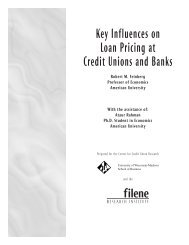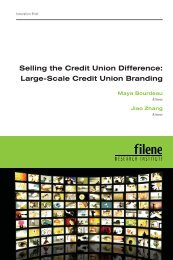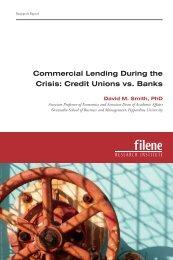Credit Union and Cooperative Patronage Refunds - Filene ...
Credit Union and Cooperative Patronage Refunds - Filene ...
Credit Union and Cooperative Patronage Refunds - Filene ...
You also want an ePaper? Increase the reach of your titles
YUMPU automatically turns print PDFs into web optimized ePapers that Google loves.
members st<strong>and</strong>ing on the basis of ownership rather than to present<br />
<strong>and</strong> former members on the basis of historical patronage.<br />
The co-op agency theory holds that the co-op is an agent of its<br />
members <strong>and</strong>, therefore, that the co-op’s earnings really belong—<br />
have always belonged—to members <strong>and</strong> have never belonged to the<br />
co-op. This theory dovetails with the principle of service at cost,<br />
which holds that patronage earnings are rebates, discounts, or price<br />
enhancements when they are allocated <strong>and</strong> distributed as patronage<br />
refunds in cash or allocated equity to members on a patronage basis. 7<br />
The co-op agency theory <strong>and</strong> service-at- cost principles support the<br />
favorable income tax treatment of co-ops. If the earnings were never<br />
the co-op’s in the first place, there is no justification for taxing the<br />
earnings at the co-op level. If the earnings are taxed, they should be<br />
taxed at the member level.<br />
Service at cost requires that earnings be distributed on a patronage<br />
basis as patronage refunds to qualify as rebates, discounts, or price<br />
enhancements that reduce “costs” to the members. If the earnings<br />
are distributed on the basis of share ownership, that distribution is<br />
a return on equity rather than a zeroing out of the co-op’s earnings<br />
to the logical conclusion that the costs of products or services are<br />
reduced to breakeven. The service-at- cost principle is not followed if<br />
the co-op’s earnings are distributed on the basis of share ownership.<br />
And what applies to the co-op’s earnings while it is a going concern<br />
also applies to its equity at its dissolution. So in a dissolution, when<br />
credit unions distribute the remaining proceeds on the basis of share<br />
ownership to the last members st<strong>and</strong>ing rather than on the basis of<br />
historical patronage to present <strong>and</strong> former members, they are deviating<br />
from the co-op agency theory <strong>and</strong> service-at- cost principles.<br />
Distribution of the remaining proceeds at dissolution should be on<br />
the basis of historical patronage going back to the beginning of the<br />
co-op to adhere to these principles consistently. If all the earnings<br />
<strong>and</strong> remaining proceeds are distributed on the basis of historical<br />
patronage, we can logically conclude that the co-op always operated<br />
at cost from its beginning to its end.<br />
The co-op principle of subordination of capital is also not followed<br />
when credit unions distribute the remaining proceeds on the basis of<br />
share ownership to the last members st<strong>and</strong>ing. This principle limits<br />
the financial return paid on equity to investors to a “reasonable”<br />
return for its use. The last members st<strong>and</strong>ing at a credit union’s dissolution<br />
benefit disproportionately to all the former members. Not<br />
only is their proportionate equity capital returned as it would be if<br />
the agency <strong>and</strong> service-at- cost theories were followed using historical<br />
patronage, but the last members st<strong>and</strong>ing receive an extraordinarily<br />
large return on that capital when the balance of the dissolution<br />
10








